|
  When
the rarity occurs that a piece of land and a golf course design
philosophy match up perfectly, there’s an opportunity to
create an extremely special golf facility. That extremely special
golf facility is Indian River Club in Vero Beach, Florida. When
the rarity occurs that a piece of land and a golf course design
philosophy match up perfectly, there’s an opportunity to
create an extremely special golf facility. That extremely special
golf facility is Indian River Club in Vero Beach, Florida.
More
than an ideal model for environmental concern, Indian River Club
was the perfection of our “Classic Design Series.”
We had a unique opportunity at Indian River Club. There was a
flow to the land that just lent itself to a classic style of
golf course. One of our main goals in every golf course we design
is to make sure that the course fits easily on the land. I believe
we accomplished that goal at Indian River Club.
We
were able to work in concert with the land. I’d like to
think that we designed a golf course that gently flows around
the property introducing players to a new level of challenge
on every hole. In addition, we were able to establish a comfort
level for players of every skill level by installing six sets
of tees. The Tournament tees provide the sternest test from 7,013
yards and the course is scaled down to 4,897 yards from the Forward
tees with all six sets of markers having a par of 72.
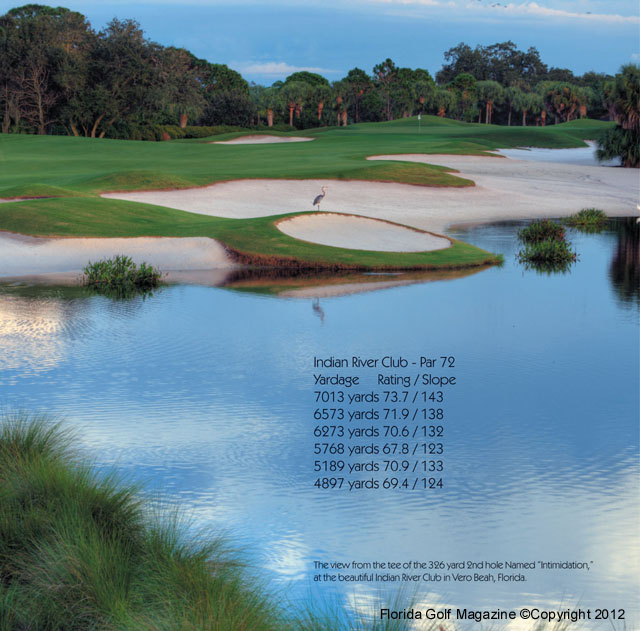
The view from
the tee of the 326 yard 2nd hole Named “Intimidation,”
at the beautiful Indian River Club in Vero Beach, Florida.
I
think most golfers will understand our interpretation of Classic
Design early in the round at Indian River Club. The second hole
is an example of how an architect can provide a unique experience
given the proper piece of land. Named “Intimidation,”
the second hole measures only 326 yards from the Tournament tees,
but standing on the tee, it appears that the hole runs on forever
and you have to crush your tee shot to even get the ball in play.
The
tee shot has to carry a marsh that looks longer than it is due
to a massive beach bunker we placed on the far shore. The top
lip of the bunker is just high enough to hide the landing area
and the rest of the hole.
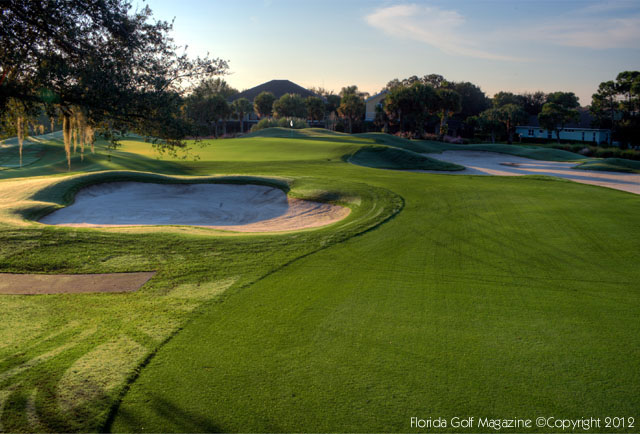
In this early morning
photo, dew still covers the well-bunkered green complex of the
326 yard 2nd hole at Indian River Club.
The smart play is a long iron
or fairway wood and a short iron into the well-bunkered smallish
green. Hopefully, once the golfer has played this hole, his or
her curiosity will be piqued for the rest of the round.
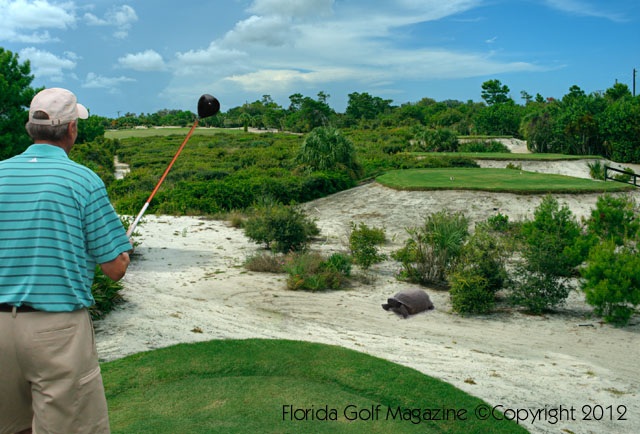
The natural setting of
the back tees of the 394-yard, par 4, sixth hole, named “Scrub
Jay,” is an ideal habitat for the blue Scrub Jay below.
While playing this hole with Florida Golf Magazine, Architect,
Ron Garl stopped to identify a Gopher Tortoise in front of the
tee-box. Scrub Jays and Gopher Tortoises are both endangered
species.
There
was a time when the popular belief was that golf course architects
were the enemy of the land and the environment. Those days are
gone now and I’d like to think that the sixth hole is an
example of our love of the land and the environment. It’s
a 394-yard, par 4 named “Scrub Jay.” The tee is set
to the rear of a natural area that runs the length of the left
side of the hole.
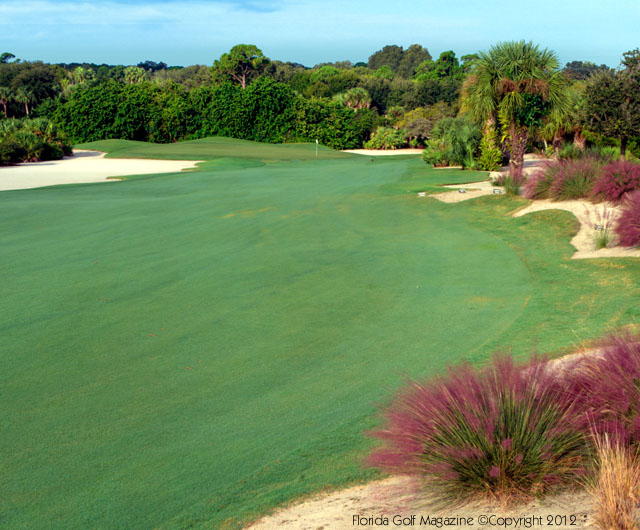
A view of the approach to the distant
green of the 394-yard, par 4, sixth hole at Indian River Club.
I
honestly believe that every golf course architect has the obligation
to preserve the environment and it is important that we leave
the habitat of endangered species as undisturbed as possible.
If you really think about it and use your imagination, areas
like this can most often be used to heighten the golf experience.
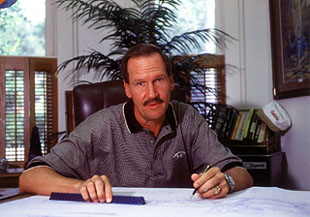
“It is our goal on every
golf course we design to be good stewards of the land, protect
the environment and provide each and every golfer with a positive
and memorable experience. We realize that the golf course will
be there long after we’re gone and it is our duty to serve
those golfers and lovers of the land who follow.” - R.G. |
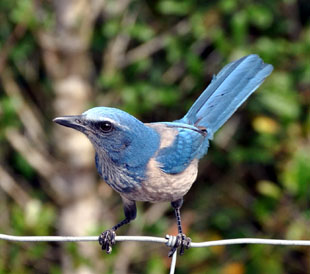
Did you know? - The 6th Hole’s
namesake, the Florida Scrub-Jay (Aphelocoma coerulescens) is
one of the species of scrub-jay native to North America. It is
the only species of bird endemic to the U.S. state of Florida.
Because of this, it is heavily sought by birderwatchers who travel
from across the country to observe this unique species. It is
known to have been present in Florida as a recognizably distinct
species since at least 2 million years ago. |
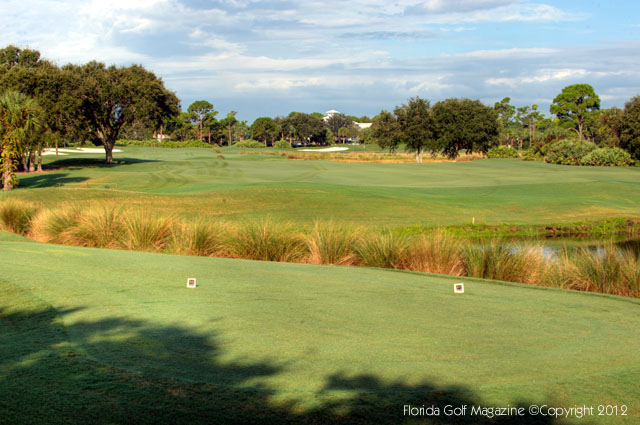
#9 Tee: We closed the front nine
with the type of par 5 that I love to design. It’s a pure
risk/reward hole named “Temptation.” The hole stretches
to 538 yards and has a generous landing area.
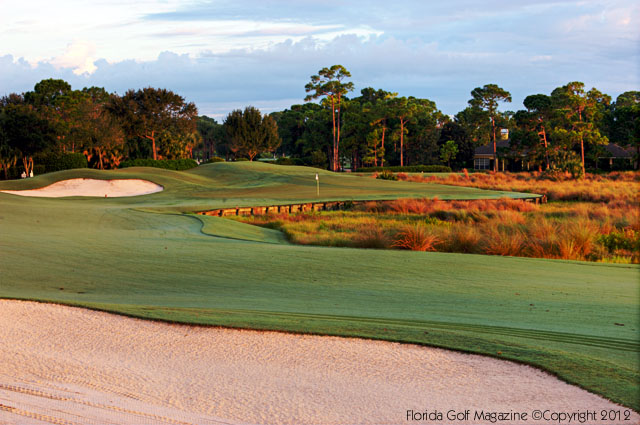
#9 Fairway: A big drive will leave you thinking that just maybe
you can carry the wetland guarding the green and you can make
a birdie in a cinch.
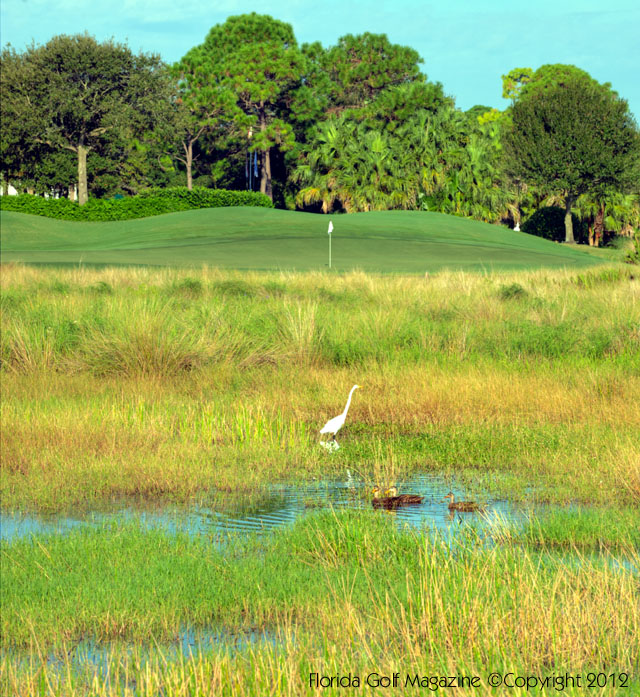
#9 Green: The prudent play will
be to settle for the one-putt birdie opportunity by laying up
between 100 and 120 yards short of the green. Greed has led to
many sad faces on the 10th tee.
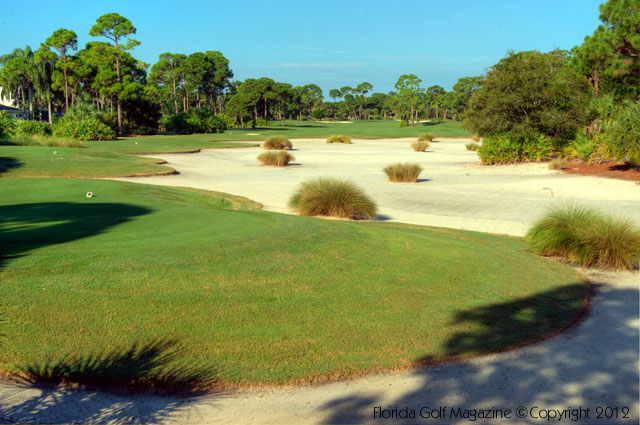
#10 Tee: You don’t want a bad attitude on the 10th tee.
This is the longest par 4 on the course stretching to a massive
length of 479 yards.
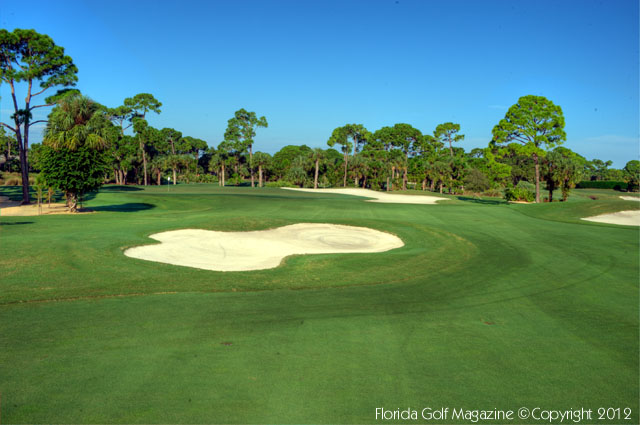
#10 Green: Named “Illusion,” this monster features
a Donald Ross style illusion bunker that appears to abut the
green, but is 50 yards short of it. Par is an excellent score
on this hole and I think the hole really sets the tone for the
incoming nine.
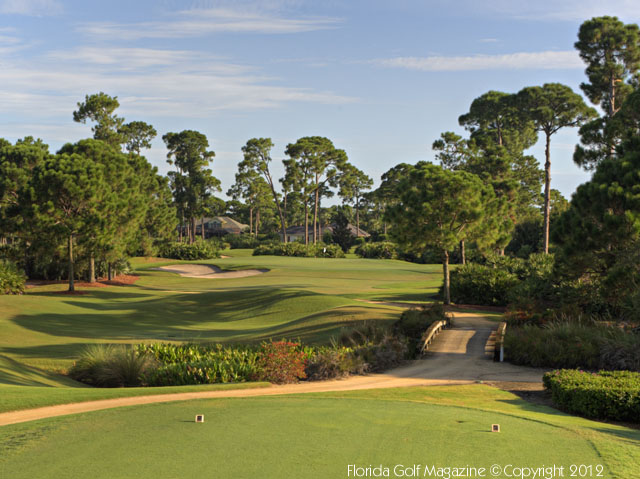
The 177-yard par three, 16th
hole at Indian River Club is named the “Needle.”
Classic designs are often measured
in part by the quality of the par 3s. We wanted the one-shot
holes at Indian River Club to be formidable. We also wanted to
build the experience to a memorable finish. We think the 177-yard
16th name the “Needle” is one of the best and is an
appropriate start to the closing stretch. We carved this hole
out of the trees and wanted to challenge the golfer to hit a
high fade.
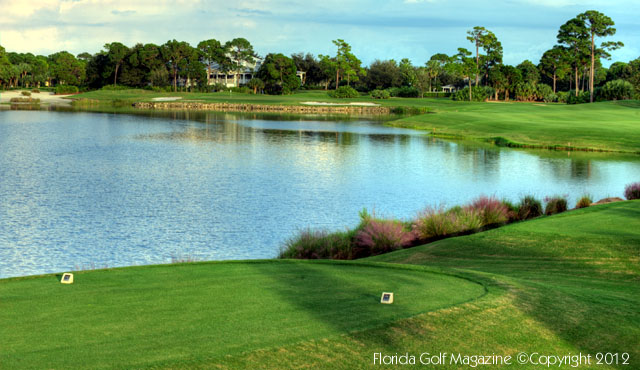
We believe that a great finishing hole is extremely important
and we were blessed with a great setting for one at Indian River
Club. The hole is 404-yards and you have to flirt with the watery
left side of the fairway to give the shortest possible shot to
this green guarded by water and a natural rock outcropping.
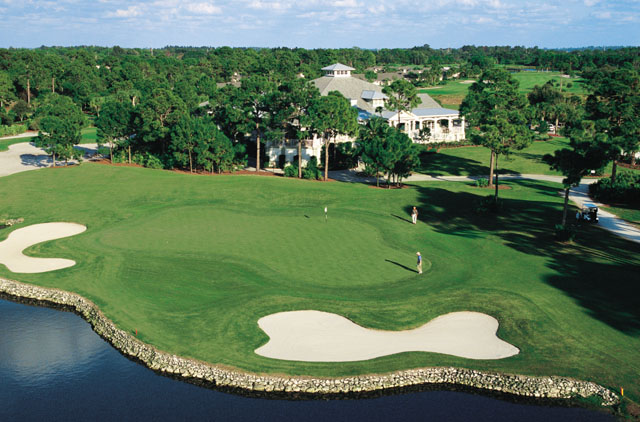
An aerial photo of the
green of the 18th hole at Indian River Club which is aptly named,
“On the Rocks”.
Named “On the Rocks,”
it describes how your ball will end up if you don’t meet
the challenge of a dangerous tee shot and a demanding second
shot. We’d like to think that this will be a fitting end
to a memorable and positive golf experience. - Ron Garl |